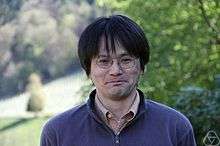Takurō Mochizuki

Takurō Mochizuki
Takurō Mochizuki (望月 拓郎, born 28 August 1972) of Kyoto University is a Japanese mathematician, whose research follows the Bourbaki style of generality and rigor. He was awarded the Japan Academy Prize in 2011 for his research on D-modules in algebraic analysis.[1][2] In 2014 he was a plenary speaker at the International Congress of Mathematicians.[3]
As a student at the University of Kyoto in 1994, Mochizuki left his undergraduate early to become a graduate student in mathematics at the same university. He completed his Ph.D. in 1999, and joined the faculty of Osaka City University, returning to Kyoto in 2004.[1]
References
- 1 2 Professor Emeritus Masahiro Shogaito and Associate Professor Takuro Mochizuki of the Research Institute for Mathematical Sciences Receive the Japan Academy Prize, Kyoto University, April 12, 2011, retrieved 2015-08-01.
- ↑ Japan Academy Prize to: Takuro Mochizuki (PDF), Japan Academy, retrieved 2015-08-01.
- ↑ "Schedule of Plenary Lectures", Seoul ICM 2014, retrieved 2015-08-01.
Additional reading
- Sabbah, Claude (January 2012), "Théorie de Hodge et correspondance de Hitchin-Kobayashi sauvages (d'après T. Mochizuki)" (PDF), Séminaire Bourbaki (in French), 1050: 1–36, MR 3087348. Also in Astérisque No. 352 (2013), Exp. No. 1050, viii, 205–241, ISBN 978-2-85629-371-3.
External links
This article is issued from
Wikipedia.
The text is licensed under Creative Commons - Attribution - Sharealike.
Additional terms may apply for the media files.